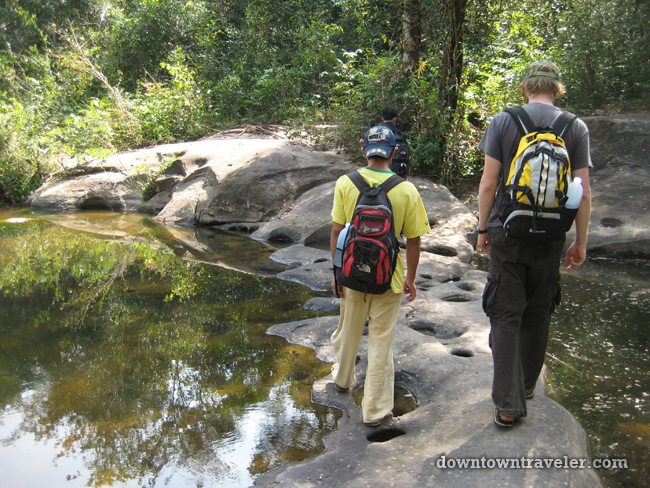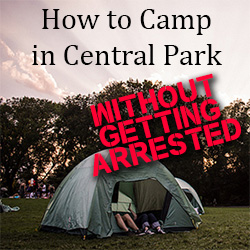Today’s guest post is written by Ethan Gelber, a blogger, communications specialist and advocate for local travel.
I remember the first time I saw ‘local travel’ mentioned in writing. I don’t recall the actual article, but I must have been thinking about food; I read ‘local’ as ‘lo-cal’ travel (i.e. travel on a low-calorie diet). My confusion didn’t last long, but it made for some welcome chuckles while I pondered the possibilities.
These days, I continue to be entertained by discussions about local travel. As a vocal advocate for this growing travel niche, I wonder about the slow but steady drip of travel bloggers who remain unconvinced of its value. Some lament how difficult it is to meet locals, while others snipe about whether the advice given by locals is reliable.
They are missing the point. “Local travel” is a descriptive term, not prescriptive. It’s a set of overarching values that help guide one’s journey and result in a far more personal, meaningful and respectful experience.
Keep reading for my top tips to help you happily, successfully and responsibly go local the next time you hit the road.
Five Tips for Going Local
#5. Connect with local people
A dream trip is often described as being picked up on arrival by an intimate (family, lover, close friend) and pulled way off the tourist trail to places known only to locals, where you hear and learn the local lingo, eat unembellished but incredible local food and really live the local culture. Local, local, local!
But what if you’re going to a place where you don’t already know someone? Well, these days, with just a little effort, it’s easy to make connections before you leave home. There are a growing number of free Web-based organizations that facilitate these connections, like Triptrotting.
If you don’t trust the Internet to meet friends, there are locals for hire (in many cases, they’re professional guides) who can ease you into the local groove. One of the many reputable sites for this is ToursByLocals.
Of course, if you’d rather just ford your own streams, there are top-notch services like Spotted by Locals that share the advice of locals and, in some cases, actually link you with locals who can help you build unique itineraries tailored to your whims and interests.
Whatever path you choose, by meeting a local person you get beyond the tourist ‘must-sees’. You still have to maneuver on your own, just like you would do at home every day; just keep your eyes and ears open, seek advice, welcome intrigue and accept invitations. Even if sparks don’t fly on your first trip in a new place, stay in touch with the people you meet. The second visit could be a whole different story.
#4. Be sensitive to the local environment
How do you like it when you visit your favorite park near home and find it full of garbage? It’s disgusting. Keep in mind that when you’re traveling; your priorities might not always mesh with those of others – especially when it comes to how much they value and honor nature.
To avoid any mishaps, it’s best to be a model traveler and make the smallest imprint possible. You’ll do right by the local people, but also the local plants and animals. As always, look for specific advice from communities of mindful travelers, like those involved in Mynatour, for example.
If you’re particularly conscientious, try offsetting the carbon emissions of your flights, stick to local buses and trains, and walk or rent a bike to get a feel for the local scene.
If a motorized vehicle is absolutely required, choose one guaranteed to make minimal impact like those available through Green Path Transfers, a global network of responsible ground transportation operators.
#3. Respect local heritage and culture
Hand in hand with respecting local nature is abiding by local norms and practices. It’s important to know a little about the place you’re visiting.
On a first visit, you can rarely immerse yourself deeply enough in a culture not to commit a faux-pas, but you can visit websites and blogs with tips for gaining cultural literacy and avoiding culture shock.
For a bit more hand-holding, try tour operators with the stated goal of helping you to ‘experience a place like a local.’ Not only do they bring you to less-visited sites, they put you in a different and well-informed mindset.
Tours can be as short as a few hours – like those available through Context – or as long as several days, such as those organized by SnoworSand.
Of course, another approach is through ‘voluntourism’, an overused word that encompasses all forms of volunteer vacations. It’s an admirable approach to travel.
#2. Spend money locally
Analysts have estimated that, on average, 70-90 cents of every dollar spent on travel never makes it to the travel destination. One way around this is to work directly with locals and the organizations that champion them. You get more bang for your buck and, more importantly, the people whose land you are visiting truly benefit (economically, as well as in other ways) from your time there.
At the simplest level, this means spending your money conscientiously: shopping in neighborhood stores, eating in the restaurants locals love, sleeping in native-owned hotels and hiring resident drivers and guides.
Gaining access to local, on-the-ground resources can present a challenge to travelers who like to book ahead of time. But sites like Much Better Adventure and Tourdust connect consumers with locally-owned business, as do new specialized search engines like Pocketvillage.
#1. Don’t overthink it
Many travelers worry too much about the details: the definition of “local” or the moral overtones. Don’t! Just hit the road, engage with the people you meet along the way and trust your gut.
If you are mindful of the local people, environment, culture and economy, you are making the most of your time and money and are maximizing the beneficial qualities of tourism.
And that, in the end, is the power of Local Travel.
***
For more information
To learn more about traveling like a local and to find local organizations, visit the Local Travel Movement, a website co-founded by this writer.
If you’ve traveled with a locally-owned company that provides high-quality service, please share your recommendation in the comments field.

About the writer
When he’s not traveling or exploring his native New York City by bicycle, Ethan Gelber is the Chief Communications Officer of the WHL Group, the largest local-travel company in the world.
Ethan also founded and edits The Travel Word blog. He can be found on Twitter at @thetravelword and on Google+.


















Great tips…thanks!
I agree that people should respect the local heritage and culture when they are traveling. It seems that they could be able to connect more to the place if they also know how to communicate with the residents. I am not sure about voluntarism because I haven’t tried it. But touring seems a nice idea.
Great post. I think one of the most important things when going local is to really keep an open mind. If you keep an open mind and being humble, and also respectful, it will help forge more genuine relationships with others. Plus you will learn and experience more of their local cultures!
Cheers!
Great tips, I especially like “respect local heritage and culture” sometimes as a traveler you have to adjust yourself to the customs of the place you visiting and I feel like that part of the traveling experience often overlooked
Hi All,
Thanks for the kind comments and excellent observations. There are plenty of cool quotes out there from an assortment of luminaries about how travel should be about being open to new places and new experiences. These days, too many people bring too much of themselves along when they travel — too much cultural baggage, too much actual luggage — leaving little room for discovery. Local Travel is about getting back to a simpler way of traveling, one that encourages more and better engagement with new things.
I’ve written a bit more about this very topic at http://www.localtravelmovement.com/98/get-lost-go-local/ .
Thank you so much for sharing your information about how to travel with the locals and how to fit in with the people in the areas that you are visiting. Will take that on board while we get ready to set off around Australia 😉
Cheers
Lisa
Hi Ethan,
BEautifully done. I have always thought a lot of the things you write…I’m glad you’re getting it out into the world. How are your kids? Are you in NYC?
Best,
Jen
Hi Jen, thanks for the very kind comment. I am now in NYC (with the kids) and all is well. Please drop me a direct line!
I totally agree that 5, 4, and 3 are sooooo important! A great post and a great interview Les:)
I really like the last one. Don’t over think it. That’s kind of my motto. 🙂
Excellent! These are great tips for making the connection.
Great post! #5 & #2 are really important…but I agree with all the tips 😉
While I think it hard to generalise about what is right and wrong, I think its sad if people go to a foreign country and don’t interact with the local people at all, its a shame because if they did often they would find it would be the most memorable part of their trip.